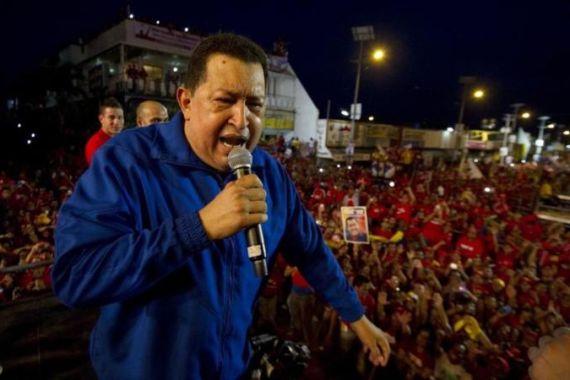Chavez applauds Venezuela satellite launch
One week ahead of presidential poll, South American leader heralds launch of satellite built by his government.

President Hugo Chavez has said the launch of Venezuela’s second satellite showed the achievements of his self-styled revolution just days before he seeks re-election.
But the incumbent’s rival Henrique Capriles said it symbolised the current government’s neglect of problems closer to home.
“We’re seeing history … Venezuela has been with China at the forefront of history,” Chavez said after standing to applaud during a video link-up between the presidential palace, a launch center in China’s Gobi Desert and a Caracas street party.
As campaigning in the close election race approaches its final week in South America’s biggest oil exporter, both political camps are planning their last huge rallies while making last-minute efforts to win over undecided voters.
Opposition candidate Capriles has mocked Chavez, who he says is focused on spreading his socialist project around the world but has done little to address the daily problems of voters such as crime, power cuts and inflation.
A dozen Venezuelan officials were at China’s Jiuquan launch center in Gansu province, near the Mongolian border, to watch the rocket carrying the “Miranda” satellite blast off into a clear blue sky.
Venezuelan state TV had broadcast hours of build-up alongside the headline “Space Revolution … a Sovereign View”.
‘This will change’
For Capriles, it was a prime example of what he calls grandiose plans that prove Chavez is out of touch with voters.
“How many Venezuelans sleep in a refuge tonight? How many towns without an ambulance? Another satellite for the candidate of continuity. On October 7 this will change,” he said on Twitter.
In 2008 China launched Venezuela’s first satellite – the Venesat-1, or “Simon Bolivar” – to carry communications gear.
The second spacecraft will take photographs that Chavez’s government says will help it protect the environment, improve urban planning and crack down on illegal mining and drug cultivation.
Both satellites were named after 19th-century South American independence heroes, the newest one being named after hero Francisco de Miranda.
The launch was beamed to big screens at a street party in Caracas’s museum district, where Chavez was mobbed by supporters when he arrived earlier in the evening to make a short speech.
In the run-up to previous elections, the president has often unveiled many projects in an effort to impress voters. This time, his campaigning has been much less intense, partly because he has suffered two bouts of cancer since June 2011.
‘Your future’
Chavez, 58, says his “bourgeois” foe will scrap his social welfare programmes, such as subsidised food stores and programmes that make cash payments to poor families with children.
“It’s your future, young people, not mine. I’ve lived,” he told thousands of red-clad supporters at a rally on Friday.
“Some people might be unhappy because of failures by our government – ‘They didn’t fix the road. The power went off. The water went off. I couldn’t find a job.'”
Live Box 2012929152954771991
He continued: “Well, that may be true in some cases and I take the responsibility … . One of my pledges is for greater efficiency in the management of the government.”
Capriles wants to tap into that frustration over day-to-day issues. He says Chavez’s government should have done much more, given the record oil revenue it has been spending.
“Don’t you think 14 years is enough? Don’t you think the time has come to move forward?” he asked at a rally on Friday.
“The skinny one is here to make you a commitment and keep to it,” he shouted, using the nickname given to him by some supporters.
Most of the best-known polls show Chavez ahead, but Capriles’ numbers have been inching up and he has a small lead in two surveys. Polls are notoriously controversial in Venezuela and public opinion shifts quickly.
Investors expect Capriles to end a five-year nationalisation drive if he wins, and reduce state intervention in the economy.
Chavez has vowed to strengthen his oil-financed socialism if he gets six more years in office.